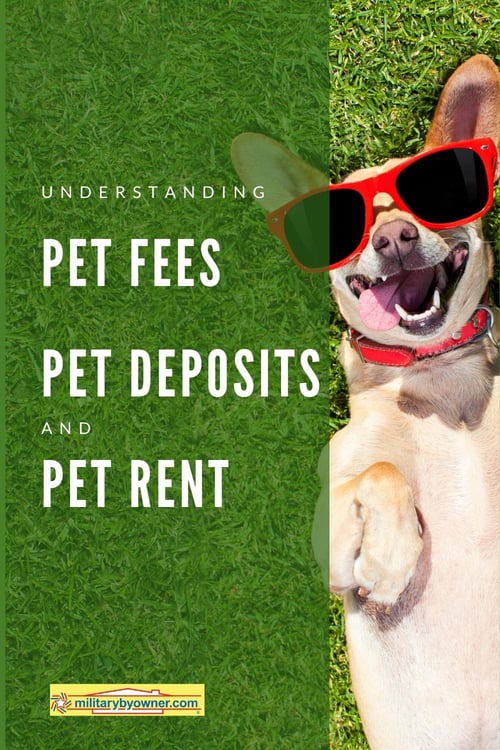Understanding Pet Fees, Pet Deposits, and Pet Rent
Setting up a new rental home can be draining financially. More often than not, you’re on the tail end of a PCS move where you’ve tossed money at hotels, gas, and food while you're on the road, and then you find a mountain of fees awaiting you at your new rental property: security deposits, the first month of rent, and if you have a pet, then pet fees.
Security deposits and advance rental payments are justifiable, but pet fees? Many of us wonder if they’re necessary. While renters can feel this wall of financial commitment is too much, landlords use it as protection. After all, a landlord’s investment in a property is far greater than rent and requires effort to ensure a high return on their investment.
Read on to learn about fees associated with pet-friendly rental properties, what they are, why they matter, and if they’re legal.
 Photo from Canva
Photo from Canva
What’s the difference between a pet fee, a pet deposit, and pet rent?
Quick definitions:
- Pet Fee: One-time fee designed to cover wear and tear to the rental caused by the pet. It’s not refundable.
- Pet Deposit: Potentially refundable, one-time fee that covers damage caused by the pet.
- Pet Rent: Monthly fee to cover both wear and tear plus any damage caused by the pet.
Now, let’s break each one down a little further.
Pet Fee
The pet fee is the one-and-done approach to pet-associated costs in rental properties. It's a non-refundable fee meant to cover the wear and tear that a tenant’s pet may cause to the property. On average, pet fees typically run between $250 to $500.
A pet fee can be a great option for both parties since the renter pays it upfront, and there’s no sliding scale that could cause a disagreement when the lease is up.
However, there are a couple of negative aspects for both parties.
- For landlords or property managers, since a pet fee is a one-time payment upon move-in rather than evaluation at the end of the lease, there’s a chance that it won't cover the wear and tear caused by the pet.
- A non-refundable pet fee can be tough for tenants to accept, especially for those with well-behaved pets who don't cause problems.
Pet Deposits
The pet deposit is most closely related to the security deposit. It’s a one-time fee that covers wear and tear plus damage to the property caused by the pet and is refundable if there's no pet damage. Pet deposits range between $100-$600 on average.
- The pet deposit offers landlords and property managers the security that they’ll have the funds to repair potential damage caused by the pet. And since it’s refundable, it delivers a decent incentive for the tenant to keep a watchful eye over their furry friend.
- Tenants can earn their money back. Ultimately, it provides an additional layer of trust in the landlord/tenant relationship. Knowing that their deposit won't wind up pocketed when the pet doesn’t cause any issues within the property can be a comfort for tenants.
 Photo from Canva
Photo from Canva
Pet Rent
Think about pet rent the same way you think about rent for the tenant. Each month, the tenant owes the landlord a set amount to allow their pet to live in the rental with them. This cost helps the landlord cover wear and tear plus any damage the pet causes to the property. Many landlords charge between $25 to $50 per animal per month for pet rent.
Pet rent increased in popularity in the mid-2000s as it allows for smaller incremental payments to help cover pet-associated fees. However, the concept has caused some push-back in the rental community for a couple of reasons:
- While pet rent can ensure a steady flow of funds to offset the damage caused by a pet in the unit, it may not provide enough to cover more significant damage.
- On the flip side, while tenants may like that it’s a smaller amount upfront, the monthly commitment can feel cumbersome and potentially amount to more than a substantial deposit or fee at the start of the lease. For instance, a rental that requires an extra $50 in pet rent each month can be difficult for a tenant's budget.
Are pet fees, pet deposits, and pet rent legal?
All of these fees might have you wondering if they’re even legal. To some surprise, the answer is not always.
“Landlords who allow pets sometimes require tenants to pay a separate deposit to cover any damages caused by the pet. In some states, this is legal; in others, it's not. Regardless of state law, under federal law, landlords may never charge a pet fee or deposit to disabled tenants who have a service or assistance animal.” –NOLO
If you have a pet and are looking for a rental property, you’ll likely face a pet fee, pet deposit, or pet rent. And in some cases, more than one. A landlord or property manager might require a pet deposit in conjunction with a nonrefundable option.
Are you looking for military homes for rent? Peruse our constantly updated inventory of homes near military bases on MilitaryByOwner.
 Photo from Canva
Photo from Canva
Is it legal to charge pet rent for a service animal?
“An assistance animal is an animal that works, provides assistance, or performs tasks for the benefit of a person with a disability, or that provides emotional support that alleviates one or more identified effects of a person’s disability. An assistance animal is not a pet.” — U.S. Department of Housing and Urban Development (HUD)
The Fair Housing Act, which you may be familiar with whether you’re a landlord or a tenant, extends protection beyond renter applicants and includes both service animals and emotional support animals. According to HUD, reasonable requests for rental applicants with assistance animals include:
- Obtain a rental property that is otherwise not pet-friendly and has a “no pets” policy.
- Waive pet fees, deposits, and rent for the assistance animal.
If a landlord refuses to comply, HUD offers a formal complaint route to assist this category of applicants in securing a rental property.
Are pet-associated fees negotiable?
Pet fees, pet deposits, and pet rent are all open to negotiation before the lease is signed.
Just as tenants have the right to question the policies in place, landlords, in most cases, have the right to reject them. As a renter enters the conversation, they should have an accurate pulse on the housing market. If the landlord has ten additional applicants knocking on the door, the tenant loses their negotiating power. Conversely, if crickets are chirping, a tenant may find they can whittle down the pet fee.
These pet-associated costs serve a purpose. While they might feel like a cash grab to tenants, they act as a protection for the landlord or property management company to maintain the quality of homes for rent. While that means tenants can expect to pay a deposit of some kind, it doesn’t mean it’s a closed topic with the landlord. Communication is critical, and opening up the discussion between a potential landlord and tenant can provide a viable outcome for both.
Renting a home or apartment? Take a look at our free checklist below before you sign on the dotted line.






